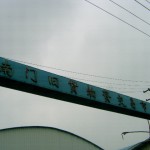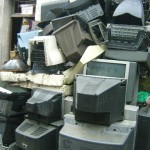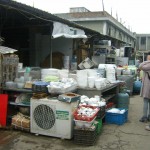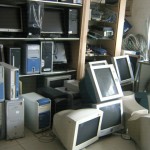Field Trip on E-waste
Posted: April 10th, 2010 | Author: Mukda Pratheepwatanawong | Filed under: waste industries | No Comments »On Friday the 9th April 2010, Ned Rossiter, Wu Yang, Lv Yulin and I visited Tian Yi Digital Plaza, EGO Digital Plaza and South Gate 2nd Hand Market in Ningbo. Our purpose was to investigate on how electronic waste are being managed in the country, where did the e-waste come from and where are they going and the current situation on the 2nd hand electronics in the e-waste industry.
(As the investigation have been carried out in Mandarin, below is my general understanding of the field trip.)
From 10 am to 11:30 am, we were at the two digital plaza walking around on the top floor, which was the floor where electronics are being repaired or they have reached the stage of the product life-cycle which they are ready to be recycled or put into the bin. By popping into a few shops asking them questions about the 2nd hand products, we found out that 2nd hand electronics are from local individuals who wanted to use new models and new products launched in the market recently. 2nd hand electronics are sold to small businesses which aim to save cost in buying electronics. If electronics are for private use, customers tend to buy new products as they believed that it will last longer. How much profit they get from selling 2nd hand electronics would depend highly on the model of the product, the number of years which the customers have used it and the remaining life expectancy of the products.
From 12:15pm to 1pm, we walked around South Gate 2nd Hand Market. We could hardly find any shops that sell or repair electronics. As soon as we found Wu Yang’s friend’s electronics shop, we popped in to asked a few questions. We found out that other electronics shops in South Gate have been closed down due to poor business. As this shop has been opened for 10 years, they could still survive in the industry because of good relations with old customers and old customers would tend to introduce this shop to new customers.
After buying products back from their customers, they would do their best to repair them so that they could earn some money by selling the products to other customers. If it is impossible to repair the products, they would deal with the external and internal parts by separating them into materials which could be sold for some money and materials which are valueless. Currently, there is no specific price for the any materials because the price depends on the economic situation and therefore the price varies from day to day. As an electronic shop which sell new products, repair and recycle old products, they survived in the industry as long as there is some profit for them to make.
In terms of electronic waste, the staff in the shop are aware on how much e-waste could damage the environment. Moreover, they are also concerned with the health of people who deal with the next step of the e-waste.
Further thoughts: In summary, Wu Yang, Yulin and I concluded that in order for the quantity of e-waste in China to be reduced, electronics should be repaired so that customers could reused them again. In addition, 2nd hand electronics should be sold at reasonably low price so that customers would be more willing to pay for the 2nd hand products.
Due to the rapid development and innovation of technology in countries like Japan and America, e-waste in these countries could be regarded as 2nd products in developing countries like China. Therefore, we assumed that the policy of importing e-waste have sustained environmental issues in China (as China does not have to deal with imported e-waste), but reusing electronics from other countries would benefit the Chinese customers as they get to pay lower price for the product which could be consider as ‘new’ to them. More importantly, this would also benefit the world’s environmental situation in the long run.
Further research: For the next field trip on e-waste, we plan to find out more about how the Chinese government is involved in managing the local e-waste, how could e-waste be managed more efficiently and the labour condition e-waste industry.





Leave a Reply